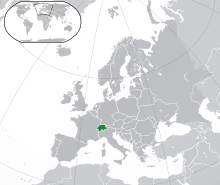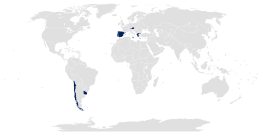| Intersex rights in Switzerland | |
|---|---|
 Location of Switzerland within Europe | |
| Protection of physical integrity and bodily autonomy | No |
| Protection from discrimination | No |
| Intersex topics |
|---|
 |
Intersex people in Switzerland have no recognition of rights to physical integrity and bodily autonomy, and no specific protections from discrimination on the basis of sex characteristics. In 2012, the Swiss National Advisory Commission on Biomedical Ethics published a report on the medical management of differences of sex development or intersex variations.[1]
History[edit]
The 12th-century canon law collection known as the Decretum Gratiani states that "Whether an hermaphrodite may witness a testament, depends on which sex prevails" ("Hermafroditus an ad testamentum adhiberi possit, qualitas sexus incalescentis ostendit.")[2][3] On ordainment, Raming, Macy and Cook found that the Decretum Gratiani states, "item Hermafroditus. If therefore the person is drawn to the feminine more than the male, the person does not receive the order. If the reverse, the person is able to receive but ought not to be ordained on account of deformity and monstrosity."[4]
Physical integrity and bodily autonomy[edit]

Researchers have argued that intersex medical interventions on intersex children violate constitutional protections from discrimination and protection of human dignity.[5][6]
In late 2012, following a request by the Director of the Federal Office of Public Health, the National Advisory Commission on Biomedical Ethics reported on the ethics of medical management of intersex, following an inquiry and multiple hearings. The Commission heard from parents, individuals with intersex traits, legal experts, and clinical practitioners. The Commission report makes a strong case against medical intervention for "psychosocial" reasons:[1]
Especially delicate are those cases where a psychosocial indication is used to justify the medical urgency of surgical sex assignment in children who lack capacity. Here, there is a particularly great risk of insufficient respect being accorded to the child's (future) self-determination and its physical integrity...
Decisions on sex assignment interventions are to be guided by the questions of what genitalia a child actually requires at a given age (apart from a functional urinary system) and how these interventions will affect the physical and mental health of the child and the future adult. Treatment needs to be carefully justified, especially since – in functional, aesthetic and psychological respects – surgically altered genitalia ... are not comparable to natural male or female genitalia. Decisions are to be guided, above all, by the child's welfare...
The harmful consequences may include, for example, loss of fertility and sexual sensitivity, chronic pain, or pain associated with dilation (bougienage) of a surgically created vagina, with traumatizing effects for the child. If such interventions are performed solely with a view to integration of the child into its family and social environment, then they run counter to the child's welfare. In addition, there is no guarantee that the intended purpose (integration) will be achieved...
... on ethical and legal grounds, all (non-trivial) sex assignment treatment decisions which have irreversible consequences but can be deferred should not be taken until the person to be treated can decide for him/herself.
— National Advisory Commission on Biomedical Ethics[1]
The report recommends deferring all "non-trivial" surgeries which have "irreversible consequences". The report also recommended criminal sanction for non-medically necessary genital surgeries.
In 2013, following publication of the Commission report, Blaise Meyrat, paediatric surgeon at Lausanne University Hospital told Swissinfo that "It’s a pity that, because of a lack of ethical clarity in the medical profession, we have to get legislators involved, but in my opinion it’s the only solution".[7]
In recent years, Advocacy group Zwischengeschlecht and researchers have documented hospital practices and guidelines that permit intersex medical interventions for esthetic and psychosocial reasons, and their human rights implications.[8][9] Zwischengeschlecht note that hospitals decline to publish statistics.[8][10]
In 2015, the UN Committee on the Rights of the Child called on Switzerland to implement recommendations of the National Advisory Commission on Biomedical Ethics, and "ensure that no one is subjected to unnecessary medical or surgical treatment during infancy or childhood, guarantee bodily integrity, autonomy and self-determination to the children concerned, and provide families with intersex children with adequate counselling and support."[11] Similar recommendations were made later the same year by the UN Committee Against Torture.[12] In July 2018, the UN Committee on the Elimination of Discrimination against Women issued concluding observations on harmful practices, recommending that Switzerland "take all necessary measures to ensure that no child undergoes unnecessary surgery intended to assign sex". The Committee also called for access to medical records, and the provision of compensation .[13]
In April 2019, the Grand Council of Geneva passed two motions, one unanimously, against the use of such surgeries, which they labelled "mutilation". The motions foresee a compensation scheme and free psychosocial counselling for the victims, as well as the dismissal of any doctor or physician who performs these procedures on intersex people without their consent.[14]
Remedies and claims for compensation[edit]
The 2012 National Advisory Commission on Biomedical Ethics report is notable for making a clear apology for damage done to intersex people in the past, and up until the present, calling for societal recognition:
The suffering experienced by some people with DSD as a result of past practice should be acknowledged by society. The medical practice of the time was guided by sociocultural values which, from today’s ethical viewpoint, are not compatible with fundamental human rights, specifically respect for physical and psychological integrity and the right to self-determination.
— National Advisory Commission on Biomedical Ethics[1]
An April 2019 motion by the Grand Council of Geneva proposed a compensation scheme.[14]
Identification documents[edit]
In 2012, the National Advisory Commission on Biomedical Ethics called for increased flexibility in amending sex as recorded in the civil status register.[1] In response to the report, the deputy director of Bern University Interdisciplinary Centre for Gender Studies called in 2013 for intersex people to be designated an "indeterminate sex".[7] Advocacy group Zwischengeschlecht has described the creation of new sex classifications as "silly season fantasies".[15]
In 2018, the National Council, the lower house of Parliament, accepted a motion to allow intersex individuals to leave their sex entry blank, with 109 votes in favour.[16] The Federal Council will now review the motions and later express recommendations.
Marriage[edit]
Same-sex marriage became legal in Switzerland on 1 July 2022[17] following a referendum on the matter in September of the previous year.[18] Intersex people may marry others with the same sex classification.
Advocacy[edit]
Swiss peer support and advocacy organizations include the peer support and advocacy organization InterAction Suisse, self-help group Selbsthilfegruppe Intersex, parent support group Verein SI Selbsthilfe Intersexualität, and advocacy organization Zwischengeschlecht.
In August 2016, Zwischengeschlecht described actions to promote equality or civil status legislation without action on banning "intersex genital mutilations" as a form of pinkwashing.[19] The organization has previously highlighted evasive government statements to UN Treaty Bodies that conflate intersex, transgender and LGBT issues, instead of addressing harmful practices on infants.[20]
See also[edit]
References[edit]
- ^ a b c d e National Advisory Commission on Biomedical Ethics NEK-CNE (November 2012). On the management of differences of sex development. Ethical issues relating to "intersexuality".Opinion No. 20/2012 (PDF). Berne. Archived from the original (PDF) on 2015-04-23. Retrieved 2017-06-25.
{{cite book}}: CS1 maint: location missing publisher (link) - ^ Decretum Gratiani, C. 4, q. 2 et 3, c. 3
- ^ "Decretum Gratiani (Kirchenrechtssammlung)". Bayerische StaatsBibliothek (Bavarian State Library). February 5, 2009. Archived from the original on December 20, 2016.
- ^ Raming, Ida; Macy, Gary; Bernard J, Cook (2004). A History of Women and Ordination. Scarecrow Press. p. 113.
- ^ Werlen, Mirjam (2008). "Rechtlicher Schutz für Kinder mit uneindeutigem Geschlecht". In Groneberg, Michael; Zehnder, Kathrin (eds.). "Intersex". Geschlechtsanpassungen zum Wohle des Kindes?. Erfahrungen und Analysen. pp. 178–215.
- ^ Biller-Andorno, Nikola (2006). "Zum Umgang mit Intersex: Gibt es Wege jenseits der Zuordnung des "richtigen Geschlechts"?" (PDF). Schweizerische Ärztezeitung (47): 2047–2048.
- ^ a b Eichenberger, Isabelle (January 23, 2013). "Third gender fights for recognition". Swissinfo. Archived from the original on November 5, 2017. Retrieved 2017-06-24.
- ^ a b Zwischengeschlecht.org (March 2014). "Intersex Genital Mutilations Human Rights Violations Of Children With Variations Of Sex Anatomy: NGO Report to the 2nd, 3rd and 4th Periodic Report of Switzerland on the Convention on the Rights of the Child" (PDF). Zurich. Archived (PDF) from the original on 2014-05-06.
- ^ Cottier, Michelle (2013). "Zivilrechtliche Aspekte der Intersexualität" (PDF).[permanent dead link]
- ^ Truffer, Daniela (2015). "It's a Human Rights Issue!". Narrative Inquiry in Bioethics. 5 (2): 111–114. doi:10.1353/nib.2015.0037. PMID 26300139. S2CID 28335241.
- ^ United Nations; Committee on the Rights of Child (February 26, 2015). "Concluding observations on the combined second to fourth periodic reports of Switzerland". Geneva. Archived from the original on July 25, 2017.
- ^ United Nations; Committee against Torture (September 7, 2015), Concluding observations on the seventh periodic report of Switzerland, Geneva
{{citation}}: CS1 maint: location missing publisher (link) - ^ Committee on the Elimination of Discrimination against Women (July 2018), Concluding observations on the fourth periodic report of Switzerland
- ^ a b "Avancée inédite contre la mutilation des intersexes". 20 Minutes (in French). 18 April 2019.
- ^ Zwischengeschlecht (November 1, 2013). ""Intersex: Third Gender in Germany" (Spiegel, Huff Post, Guardian, ...): Silly Season Fantasies vs. Reality of Genital Mutilations". Archived from the original on June 24, 2017. Retrieved 2017-06-24.
- ^ (in French) LE DÉBAT SUR LE 3E SEXE EST LANCÉ
- ^ Foundation, Thomson Reuters (July 1, 2022). "In Switzerland, first same-sex couples say "I do"". news.trust.org. Retrieved 2022-08-23.
{{cite web}}:|first=has generic name (help) - ^ Coote, Darryl (September 26, 2021). "Switzerland overwhelming votes 'yes' to same-sex marriage". UPI. Retrieved 2022-08-23.
- ^ ""Intersex legislation" that allows the daily mutilations to continue = PINKWASHING of IGM practices". Zwischengeschlecht. August 28, 2016. Archived from the original on September 19, 2016.
- ^ "TRANSCRIPTION > UK Questioned over Intersex Genital Mutilations by UN Committee on the Rights of the Child - Gov Non-Answer + Denial". Zwischengeschlecht. May 26, 2016. Archived from the original on September 19, 2016.
Bibliography[edit]
- National Advisory Commission on Biomedical Ethics NEK-CNE (November 2012). On the management of differences of sex development. Ethical issues relating to "intersexuality".Opinion No. 20/2012 (PDF). Berne. Archived from the original (PDF) on 2015-04-23. Retrieved 2017-06-25.
{{cite book}}: CS1 maint: location missing publisher (link) - Truffer, Daniela (2015). "It's a Human Rights Issue!". Narrative Inquiry in Bioethics. 5 (2): 111–114. doi:10.1353/nib.2015.0037. PMID 26300139. S2CID 28335241.
- United Nations; Committee on the Rights of Child (February 26, 2015). "Concluding observations on the combined second to fourth periodic reports of Switzerland". Geneva.
- United Nations; Committee against Torture (September 7, 2015), Concluding observations on the seventh periodic report of Switzerland, Geneva
{{citation}}: CS1 maint: location missing publisher (link) - Zwischengeschlecht.org (March 2014). "Intersex Genital Mutilations Human Rights Violations Of Children With Variations Of Sex Anatomy: NGO Report to the 2nd, 3rd and 4th Periodic Report of Switzerland on the Convention on the Rights of the Child (CRC)" (PDF). Zurich.
- Zwischengeschlecht.org (March 2015). Intersex Genital Mutilations Human Rights Violations Of Children With Variations Of Sex Anatomy: NGO Report on the Answers to the List of Issues (LoI) in Relation to the Initial Periodic Report of Switzerland on the Convention on the Rights of Persons with Disabilities (CRPD) (PDF). Zurich.
{{cite book}}: CS1 maint: location missing publisher (link)[permanent dead link]